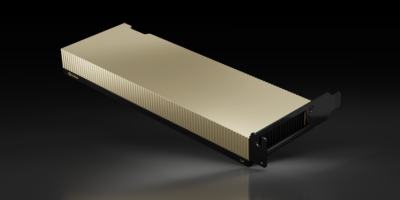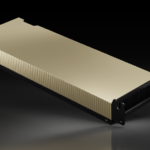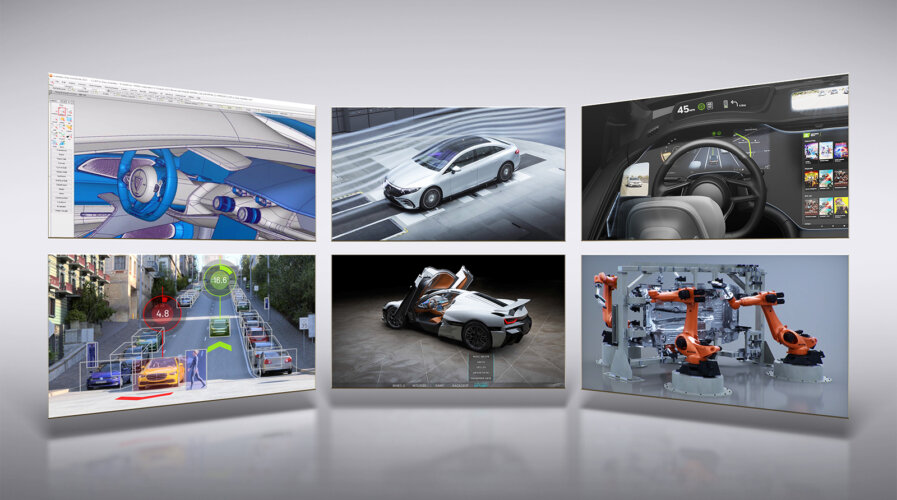
NVIDIA Omniverse automotive digitalization (Source – NVIDIA)
From cloud to car: The game-changing contributions to the automotive world from NVIDIA
- NVIDIA broadens Omniverse Cloud to fuel industrial digitization.
- World’s leading EV manufacturer, BYD, collaborates with NVIDIA to create mainstream software-defined vehicles using NVIDIA DRIVE.
The cutting-edge cloud technology and AI-driven platforms from NVIDIA have been instrumental in transforming the automotive sector, leading to unparalleled advancements in vehicle performance, safety, and connectivity.
Automakers are digitizing every aspect of the product lifecycle — including concept creation, design, engineering, software development, electronics, smart factories, autonomous driving, and retail — leveraging the NVIDIA Omniverse platform and AI.
Omniverse, built on the Universal Scene Description (USD) framework, revolutionizes intricate 3D workflows by enabling teams to connect, tailor 3D pipelines, and simulate vast, physically accurate virtual environments.
At a recent NVIDIA GTC event, BMW Group, in collaboration with NVIDIA, announced the expansion of NVIDIA Omniverse’s utilization for constructing and managing industrial metaverse applications throughout its global production network.
BMW Group: A digital-first strategy with NVIDIA Omniverse
BMW Group leads the way in a crucial new manufacturing approach — adopting a digital-first strategy, where virtual worlds are employed to optimize layouts, robotics, and logistics systems long before actual production commences.
“We are excited and incredibly proud of the progress BMW has made with Omniverse. The partnership will continue to push the frontiers of virtual integration and virtual tooling for the next generation of smart-connected factories around the world,” Huang said during the GTC keynote.
BMW Group’s production network is set to reap the advantages of digital transformation provided by Omniverse.
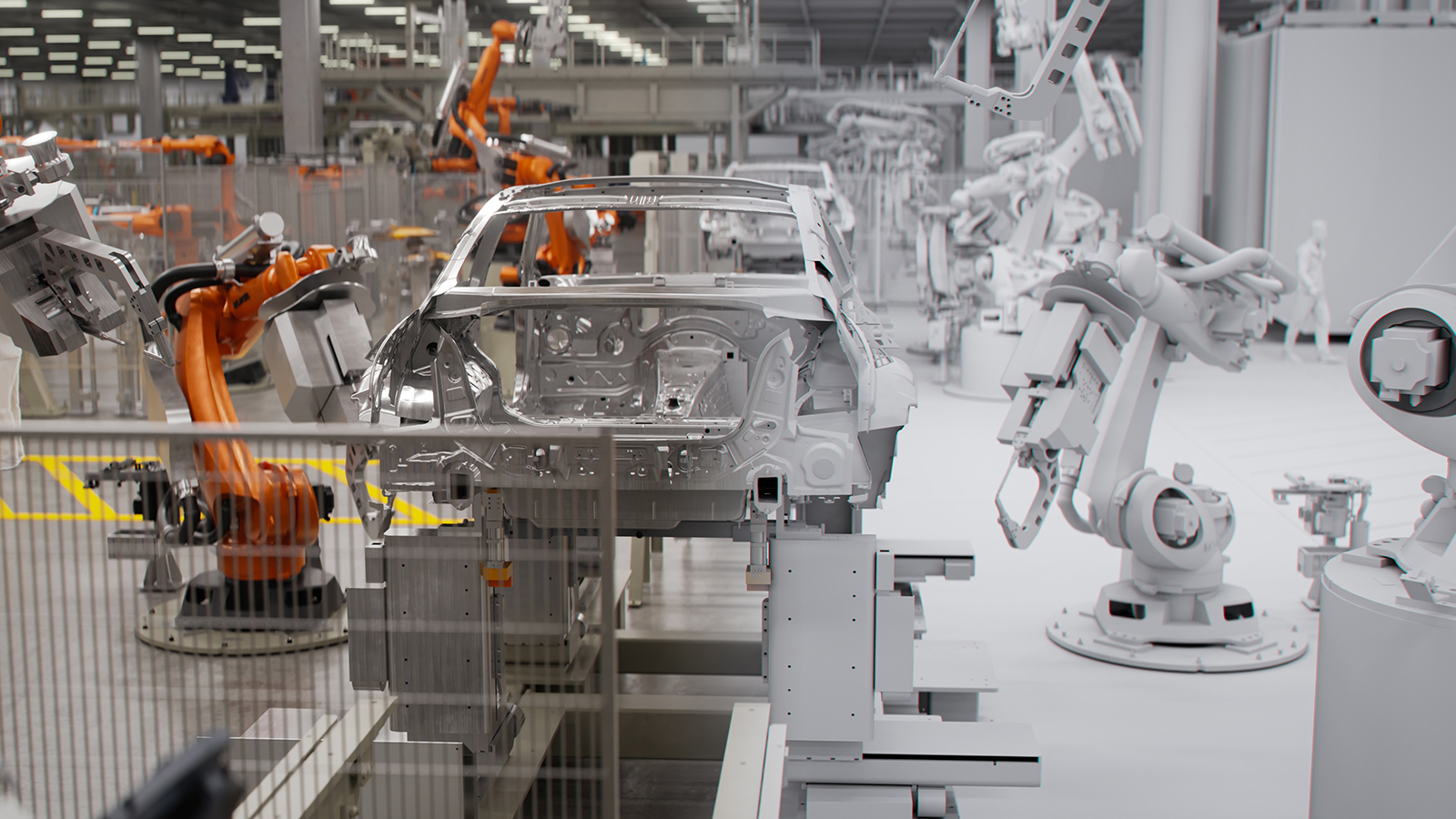
BMW Group rolls out NVIDIA Omniverse (Source – NVIDIA)
Operating factories and employing factory planners worldwide, BMW’s planning process is intricate. The company relies on numerous software tools and processes to facilitate collaboration across locations and time zones, but these approaches have limitations.
Omniverse, a development platform founded on Universal Scene Description (USD), serves as a 3D language that enables interoperability between various software suites. It allows BMW to integrate existing software and data repositories from prominent industrial CAD and engineering tools like Siemens Process Simulate, Autodesk Revit, and Bentley Systems MicroStation.
The platform empowers BMW teams to cooperate within virtual factories globally, providing a cohesive approach to data management and facilitating real-time updates across teams.
Equipped with these new capabilities, BMW can now exclusively conduct validation and testing in a virtual environment, expediting production timelines and enhancing efficiency throughout all its facilities.
Automotive makers adopting NVIDIA Omniverse Cloud
Omniverse Cloud capitalizes on the achievements and experiences of early Omniverse Enterprise clients, including not only BMW Group but also Geely Lotus and Jaguar Land Rover.
Geely Lotus is embracing Omniverse Enterprise to create digital twins of its factories, optimizing manufacturing processes in the process.
Jaguar Land Rover employs Omniverse to produce synthetic data for training AI models, and to verify perception and control algorithms using authentic driving situations. The automaker has integrated Omniverse with its cutting-edge vehicle dynamics models, virtual electronic control units, virtual automotive networks, and cloud infrastructure, which allows teams to swiftly refine software ideas.
The future of programmable cars with NVIDIA and cloud
NVIDIA’s Omniverse is not the sole technology automakers are harnessing. Pioneers in the transportation sector are propelling their next-gen vehicles by utilizing NVIDIA DRIVE end-to-end solutions that cover the cloud to the car.
BYD, the world’s top-selling new energy vehicle (NEV) brand, revealed at NVIDIA GTC that it is adopting the NVIDIA DRIVE Orin centralized compute platform for a broader range of vehicles in its mainstream Dynasty and Ocean series of NEVs.
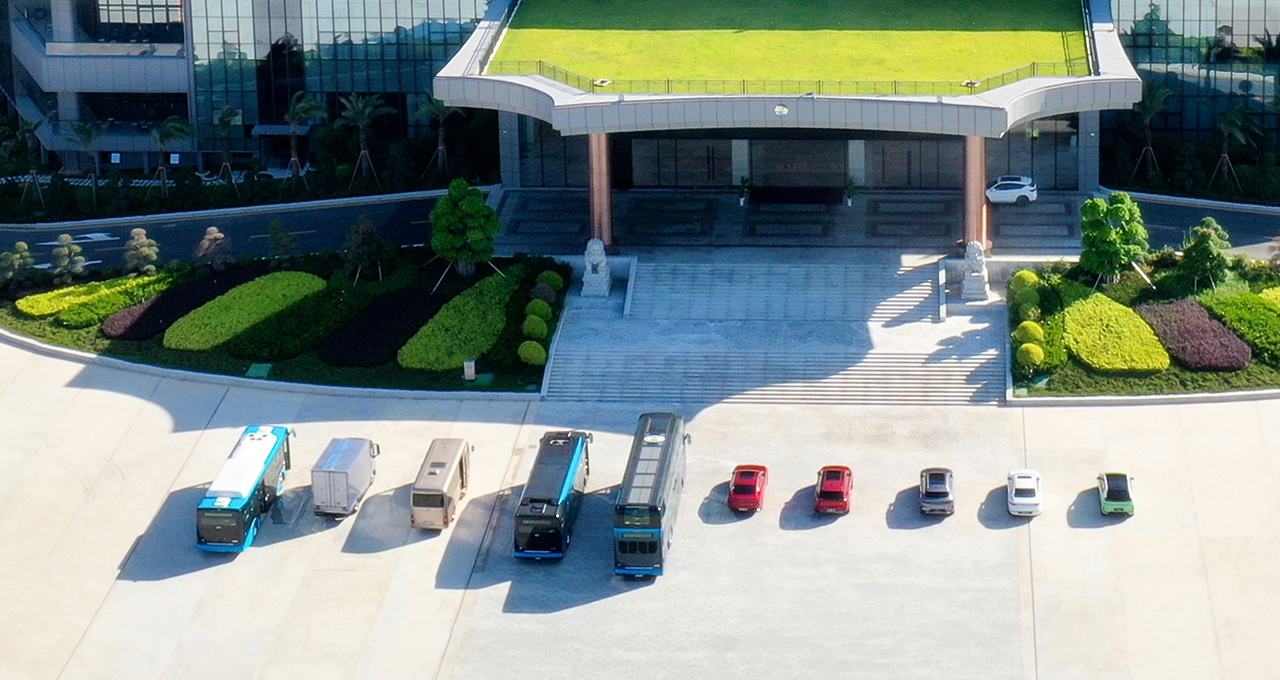
BYD and NVIDIA (Source – NVIDIA)
This follows BYD’s recent announcement of integrating the NVIDIA GeForce NOW cloud gaming service into its vehicles to enrich the in-car experience.
Rishi Dhall, NVIDIA’s vice president of automotive, emphasized that NVIDIA DRIVE Orin has gained tremendous success among global mobility leaders constructing the software-defined future. He added, “Our ongoing collaboration with BYD exemplifies the industry’s trust in DRIVE Orin as the centralized computer for today’s and future intelligent vehicles.”
Commitment to safer, smarter, and more enjoyable in-vehicle experiences
Both NVIDIA and BYD concur that future cars will be programmable, transitioning from numerous embedded controllers to high-performance centralized computers, with features delivered and improved via software updates throughout the vehicle’s lifespan. DRIVE Orin’s compute power is crucial for real-time diverse, redundant sensor processing, offering automakers the necessary computational capacity to develop and maintain new software-driven services for the entire vehicle’s life.
Since its production debut last year, DRIVE Orin — the market’s highest-performing automotive-grade processor — has emerged as the preferred AI engine for the transportation industry’s new generation of NEVs, robotaxis, shuttles, and trucks. Built to comply with strict safety standards, the scalable DRIVE Orin platform can perform up to 254 trillion operations per second, empowering AI cockpits and automated driving functions, concurrently running multiple deep neural networks to ensure optimal safety and reliability.
NVIDIA’s commitment to safer, smarter, and more enjoyable in-vehicle experiences is central to all aspects of its DRIVE platform, from AI training in data centers to delivering high-performance centralized computing in cars.
READ MORE
- 3 Steps to Successfully Automate Copilot for Microsoft 365 Implementation
- Trustworthy AI – the Promise of Enterprise-Friendly Generative Machine Learning with Dell and NVIDIA
- Strategies for Democratizing GenAI
- The criticality of endpoint management in cybersecurity and operations
- Ethical AI: The renewed importance of safeguarding data and customer privacy in Generative AI applications

